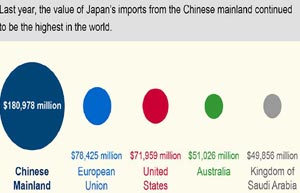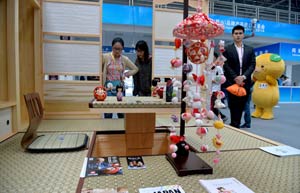"The ASEAN market is a priority for Japanese investors not only because of its population - India also has a large population - but also because Japanese products are still preferred in these countries," says Fujii from KPMG.
Many Japanese companies involved in the automobile, electronics and consumer goods markets already have a strong market share in ASEAN, which they want to keep.
In August, leading Japanese consumer products manufacturer Kao Corporation announced that it plans to boost its presence and manufacturing facilities in ASEAN.
Kozo Saito, an executive officer at Kao, says the company will invest about $400 million in Thailand and Indonesia to increase its manufacturing capacity and launch more products, as these countries are management centers within ASEAN.
The move comes in the run-up to the launch of the ASEAN Economic Community next year, which is expected to stimulate regional consumer demand. Kao has three production bases in the region - in Thailand, Indonesia and Vietnam.
In June, Kao completed its second production plant in Indonesia. The new plant, located in Karawang International Industrial City in Java, Indonesia's most developed island, was built to meet the growing needs of the Indonesian market and will produce the new detergents Kao launched in the country in July.
Michitaka Sawada, Kao president and CEO, said in a statement: "Indonesia is a critical market for the success of Kao's global growth strategy. The new plant will play an important role as a production base for the Indonesian market and other Asian markets in the future."
Japan invested over $10 billion in Thailand in 2013, twice what it invested there in 2012. It also invested $4 billion in Indonesia, $3 billion in Vietnam, and $1.2 billion in the Philippines. Japanese investment increased in all ASEAN countries in 2013, except in Malaysia, where Japan's FDI contracted $43 million year-on-year.
Japan is the largest source of FDI in Thailand, where companies focus mainly on the automobile and consumer goods sectors in the country. Foreign investors involved in the manufacturing sector may not receive as many incentives from the Thai government as before.
"Nothing has changed at the moment, but the Thai government is showing some intention to change the policy on foreign investment incentives," says Fujii. "They want to shift more investment to high-end industries instead of the low-end manufacturing industry."
Myanmar is still a FDI greenfield. However, investors see great potential in its natural resources. In this regard, Japanese firms are a step ahead of companies from the United States and European Union.
"The Japanese government is strongly supportive of the Myanmar government, that's why we have a bit more investment here in Myanmar," says Fujii. "Japan is supporting Myanmar financially to develop its infrastructure so that foreign companies can make their investments in Myanmar."
ASEAN FDI in Japan is rather limited. Last year, only four ASEAN countries invested in Japan. Singapore's investments in Japan in 2013 totaled $325 million, Malaysia $75 million, and the Philippines and Thailand $7 million and $3 million, respectively.
Patrick says that ASEAN investors are more likely to focus on niche areas and new technology when it comes to investing in Japan. The industry in Japan receiving the most FDI last year was electric machinery, which received $1.5 billion.
"(ASEAN investment in Japan) may change to a certain degree, with Abenomics (referring to Prime Minister Shinzo Abe's economic policies, including fiscal stimulus) and changes in the current administration," says Patrick. "But the general trend in Japan is to avoid a complete hollowing out of the technology advantages they have."
 |
 |
| Infographics: Ties that bind China-Japan trade |
|
